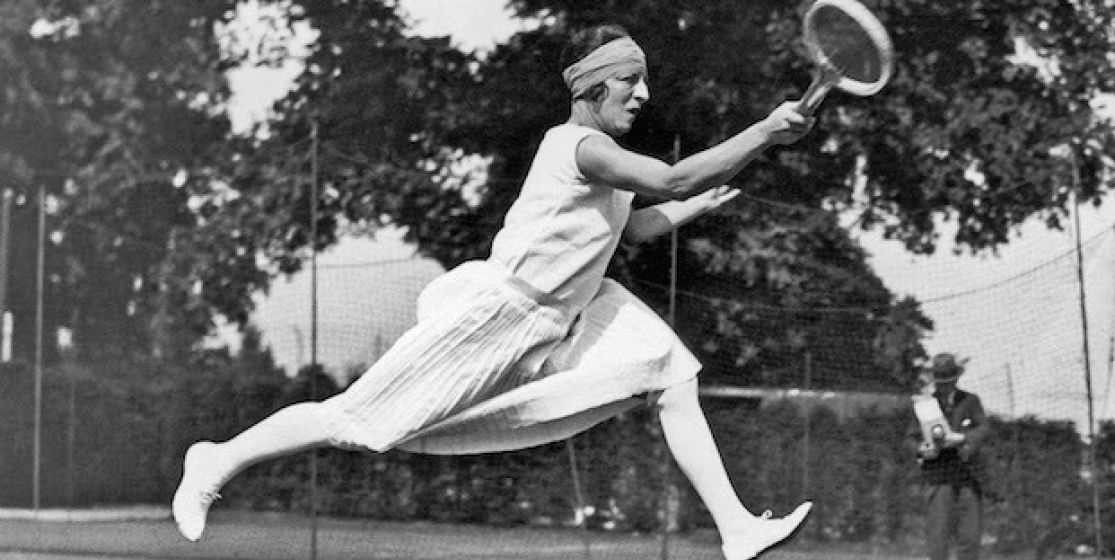In 1926, on the court of the Carlton Hotel of Cannes, was held one of the most mythical matches in the history of women’s tennis : the only confrontation between the two stars of the interwar years, Suzanne Lenglen and Helen Wills, followed by a learned assembly of royal figures and stars from that time.
The year 1926 is considered a golden age of what will later be called « the roaring twenties », a blessed period during which a new way of life, as well as new schools of thought such as logical positivism, individualism and enjoyment were celebrated. It also saw the emergence of dadaism, surrealism, Art Deco, the peak of silent films, the triumph of la Revue Nègre at the Champs-Élysées theater with Joséphine Baker and Sydney Bechet. The headliners of this blessed time were named Mistinguett, Maurice Chevalier, Dali, Picasso, Miro, Man Ray, Aragon or André Breton. An unprecedented cultural and artistic agitation, during which sport also went through a revolution, leaving its elitist and confidential rigidity to conquer the working class. At the start of this year 1926, the most famous sportswoman, in France but also in Great-Britain, was Suzanne Lenglen. As a proof of her fame, she was given a nickname, and not just any nickname : « La Divine » (The Goddess). An outstanding, elegant, charismatic and hot-headed champion. Between 1919 and 1925, she won five French Internationals and six Wimbledon tournaments, winning all the tournaments in which she played with great ease and a lot of elegance. She brought women’s tennis to a new era, hitting precise and powerful shots, with a previously unseen legwork, thanks to shorter outfits, like her famous knee-length skirt. At the start of this year 1926, Suzanne Lenglen is the ultimate star of women’s tennis. The rumor says she’s unbeatable. And it must be verified. It’s then decided to organize a sort of world cup final between the one who’s been dominating the european circuit for many years, and Helen Willis, who has started to win everything at home, in the United States.
Kings, counts, barons and maharadjas
Wills is the rising star while Lenglen is at the top of her glory. There is more than a six year gap between the two champions but the American, who’s only 20 at the time, has started to collect an impressive number of titles and trophies. She’s notably won the three last editions of the US National, the ancestor of the US Open. At the time, travelling from one continent to another was more complicated than today : Lenglen never went to challenge the Americans on their soil, while Wills only started to go back and forth between the two sides of the Atlantic later in her career. For these two to face each other, an event had to be organized. Two players from the men’s circuit, the Swiss Charles Aeschlimann and the New-Zealander Francis Fisher, acted as promoters. They managed to fix a date, February 16th, 1926, and a place, the Carlton Hotel, on the Riviera, where Aeschlimann was staying. The Cannes hotel’s main tennis court was chosen to be the scene of this exceptional match. The tickets for this show were sold in a few hours, at the highest prices. Among the 3000 or 4000 spectators officially present in the stands, a few members of royalty and some of the most powerful people of the time ; Georges, prince of Greece, Manuel II, the last king of Portugal, Dukes of Westminster and Connaught, the heir to the throne of Russia, Kirill 1st, the king of Sweden Gustav V, barons, a maharadjah…some curious neighbors who didn’t have tickets were climbing on the roofs to take a glance at the two champions. They arrived at 11 a.m, with obviously a bit more applause and support for the Parisian Suzanne Lenglen, who’s been training in Nice, which is pretty close, since her teenage years. Lenglen against Wills, headband against cap, experience against energy : the « match of the century » like the many journalists present that day called it, was ready to begin.
Confusion of the umpire, and Lenglen’s nervousness
The first rallies begin at 11.20 a.m. Huge favorite, Lenglen immediately takes the lead but her young opponent is holding on. Surprisingly, the Frenchwoman seems to be the most nervous of the two. The pressure is huge for her against a very young, but very cold-blooded Californian. La Divine takes her serve, than loses hers, takes Wills’ serve again to finally win the first set 6/3. On the court’s sidelines’, before the start of the second set, Lenglen seems however strangely nervous. She drinks a bit of water, maybe cognac, as it has been one of her habits since the start of her career, while Wills remains steady, choses not to eat or drink anything while patiently waiting for the match to resume. Bluff ? In any case, the second set is tighter than ever. At 6/5 for her, Lenglen believes she stroke a winner but the umpire George Simond changes his mind and announces it out. In a certain confusion, Wills equalizes at 6/6. A short delay however : in a lest effort, the favorite matches the odds by winning the second set 8/6 as well as the match, after exactly 59 minutes of playing time. Paradoxically however, the Frenchwoman’s victory is also her swan song. Still paralyzed by nervousness and depression, she ended up being in the centre of a big controversy at Wimbledon a few months later, when she refused to play a match to protest against a change in her planning, despite the presence of the Queen Mary, George V’s spouse in the stands. A capital offence welcomed with boos from the audience ! Confronted to an inextricable situation, she decided to put an end to her amateur career and leave a circuit which will be dominated by Helen Wills for a couple of years, her opponent of the day under the Cannes sun.






